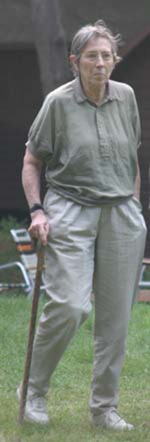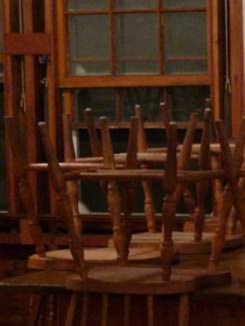 © Beki Greenwood 2009by long-time FNCA historian
© Beki Greenwood 2009by long-time FNCA historian
Louise Dole Woofenden
(pictured at right)
The "Plans for New Church Instruction" in the setting of a summer camp was not new when in 1921 the first session of the Fryeburg New Church Assembly was held. There had been an earlier attempt at such a school in Lovell ME a few years before, and several of the founders of the FNCA had attended the Almont Summer School, a New Church Camp in Michigan, founded in 1899. One Maine site, which may be the one on which we now stand, was under construction as far back as 1912. It had once been a Methodist camp meeting ground, and then was used for ten years for Chatauqua Assemblies.
Two ministers, the Revs. Warren and Small, investigated sites in Yarmouth, Freeport and other locations without reaching a decision. The Rev. John Whitehead had been a long-time summer resident of Fryeburg and he was joined by other members of the Fryeburg, Boston, and other New Church societies to carry the idea on.
The Rev. Baman N. Stone, minister in Fryeburg, felt that the time was not ripe for a camp here and the main plan drifted along. But when Mr. Louis A. Dole became minister in Fryeburg in the fall of 1920, he, Mr. Whitehead, and others immediately planned for a camp the next year. In 1921 the meetings were held in the village, with housing in private homes in the town, classes at the church, and meals in New Church Hall. Young people slept in tents on the shore of Lovewell's Pond (Monument Beach side). The session lasted one week, at the cost of $17.00 for room and board. Lectures were at 2:00 and 3:00 p.m., and children's classes at 4:00.
 © Anna Rich 2009The session was increased to two weeks the next year. And within a few years the number of participants grew to the point where it seemed necessary to own grounds and buildings. In 1928 the Assembly incorporated as a non-profit educational and religious organization. That same year, 12 acres of partially wooded land along the Saco River became available and through contributions of many people in Fryeburg and elsewhere (mainly Boston church members) it was bought.
© Anna Rich 2009The session was increased to two weeks the next year. And within a few years the number of participants grew to the point where it seemed necessary to own grounds and buildings. In 1928 the Assembly incorporated as a non-profit educational and religious organization. That same year, 12 acres of partially wooded land along the Saco River became available and through contributions of many people in Fryeburg and elsewhere (mainly Boston church members) it was bought.
 © Nancy F. Little 2009
© Nancy F. Little 2009The objective of the Assembly was, as it is now, to bring together in a beautiful setting people of all ages for instruction in the church's teachings and their bearing on problems in life, and for the opportunity for recreation and social interaction.
In 1928 another history-making event occurred. On the shores of Lovewell's Pond, a group of young adults gathered around a fire and decided to form an organization, which they were inspired to call the "Flames." We understand that all but two of these people were Swantons, proving how family solidarity has been one of the strong points of the camp from the very beginning. After the Flames had come into existence, the children were called "Sparks". The Flames have continued vigorously over the years, with their own schedule of activities plus Outing Day trips, corn boils, bowling, canoeing, tubing and other special activities.
